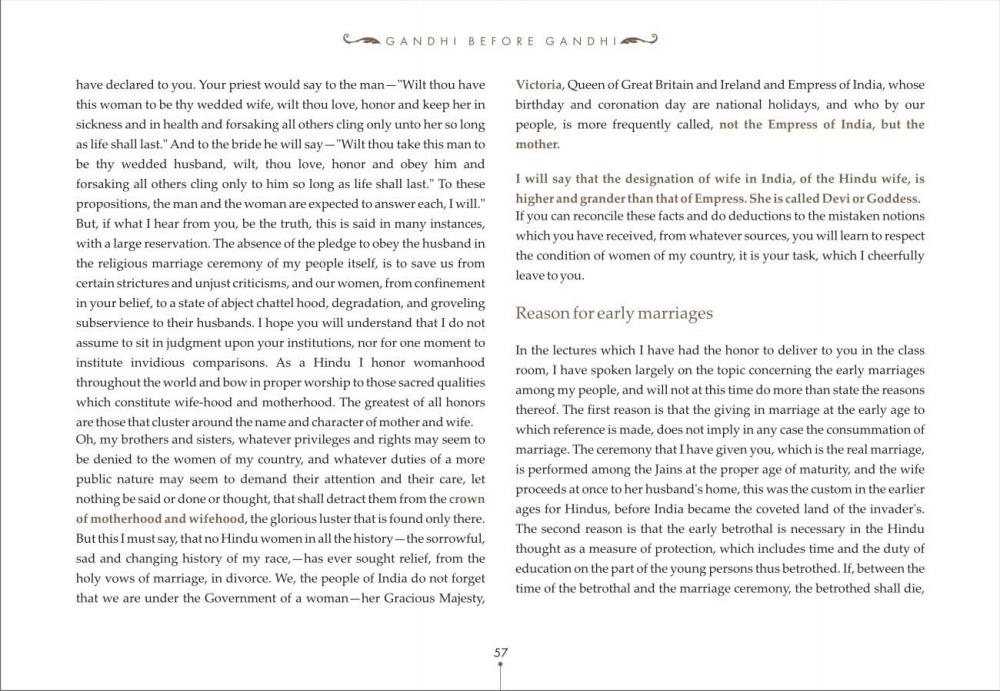________________
GANDHI BEFORE GANDHI
Victoria, Queen of Great Britain and Ireland and Empress of India, whose birthday and coronation day are national holidays, and who by our people, is more frequently called, not the Empress of India, but the mother.
I will say that the designation of wife in India, of the Hindu wife, is higher and grander than that of Empress. She is called Devi or Goddess. If you can reconcile these facts and do deductions to the mistaken notions which you have received, from whatever sources, you will learn to respect the condition of women of my country, it is your task, which I cheerfully leave to you.
Reason for early marriages
have declared to you. Your priest would say to the man- "Wilt thou have this woman to be thy wedded wife, wilt thou love, honor and keep her in sickness and in health and forsaking all others cling only unto her so long as life shall last." And to the bride he will say-"Wilt thou take this man to be thy wedded husband, wilt, thou love, honor and obey him and forsaking all others cling only to him so long as life shall last." To these propositions, the man and the woman are expected to answer each, I will." But, if what I hear from you, be the truth, this is said in many instances, with a large reservation. The absence of the pledge to obey the husband in the religious marriage ceremony of my people itself, is to save us from certain strictures and unjust criticisms, and our women, from confinement in your belief, to a state of abject chattel hood, degradation, and groveling subservience to their husbands. I hope you will understand that I do not assume to sit in judgment upon your institutions, nor for one moment to institute invidious comparisons. As a Hindu I honor womanhood throughout the world and bow in proper worship to those sacred qualities which constitute wife-hood and motherhood. The greatest of all honors are those that cluster around the name and character of mother and wife. Oh, my brothers and sisters, whatever privileges and rights may seem to be denied to the women of my country, and whatever duties of a more public nature may seem to demand their attention and their care, let nothing be said or done or thought that shall detract them from the crown of motherhood and wifehood, the glorious luster that is found only there. But this I must say, that no Hindu women in all the history--the sorrowful, sad and changing history of my race, -has ever sought relief, from the holy vows of marriage, in divorce. We, the people of India do not forget that we are under the Government of a woman-her Gracious Majesty,
In the lectures which I have had the honor to deliver to you in the class room, I have spoken largely on the topic concerning the early marriages among my people, and will not at this time do more than state the reasons thereof. The first reason is that the giving in marriage at the early age to which reference is made, does not imply in any case the consummation of marriage. The ceremony that I have given you, which is the real marriage, is performed among the Jains at the proper age of maturity, and the wife proceeds at once to her husband's home, this was the custom in the earlier ages for Hindus, before India became the coveted land of the invader's. The second reason is that the early betrothal is necessary in the Hindu thought as a measure of protection, which includes time and the duty of education on the part of the young persons thus betrothed. If, between the time of the betrothal and the marriage ceremony, the betrothed shall die,




